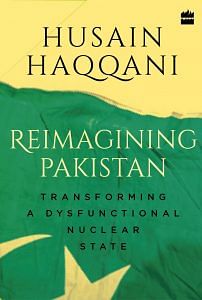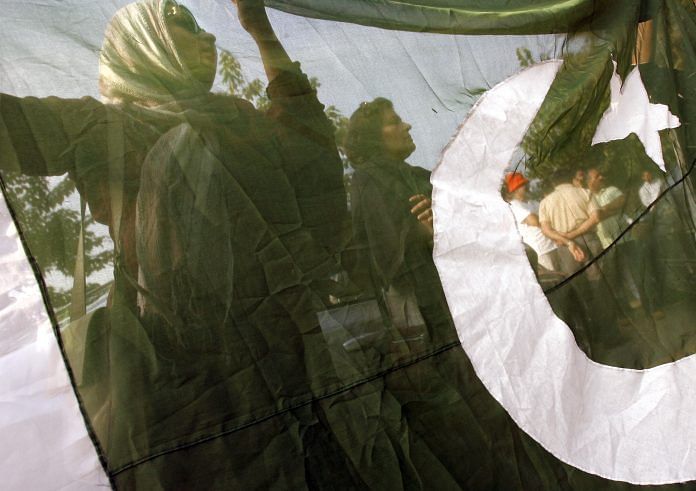In his new book ‘Re-imagining Pakistan’, Husain Haqqani rightly points out that the blame for what ails the country is rarely put on Pakistanis themselves.
“After all, Pakistan was the creation of one clever man, Jinnah; the difference between a slick political trick and a mass movement was apparent in the contrast between Karachi and New Delhi.”
“Pakistan is not a nation and hardly a state. It has no justification in history, ethnic origin, language, civilisation, or the consciousness of those who make up its population. They have no interest in common, save one: fear of Hindu domination.”
These observations were made less than a decade apart – in August 1947 and 1956 – and the irony is that both were made by Americans, a country that has had a contradictory and continuing relationship with Pakistan, and which continually features in the new book, ‘Re-imagining Pakistan: Transforming a Dysfunctional Nuclear State‘ by Husain Haqqani.
Jinnah had told a visiting American diplomat before Partition that “without the existence of Pakistan, a Hindu controlled India with all of its manpower, resources and imperialist tendencies”, would attempt to fill the vacuum created by the British departure. Pakistan would block this development, “but the Pakistan-Middle East bloc would need assistance from Britain and the Unites States if it were to stand up to Soviet aggression”.
The author believes this “has since become Pakistan’s strategic vision”.
In India, much is made of Jinnah’s Constituent Assembly speech of 11 August 1947, with its ‘secular’ vision for Pakistan. But Haqqani also brings in a golden nugget from the speech about Jinnah’s “expectation that India and Pakistan would live side by side, like the United States and Canada, obviously with open borders, free flow of ideas and free trade”.
The contradictions in Jinnah’s thinking are apparent from these two diverging thoughts, uttered just a few months apart in 1947. His hopes for a regional equilibrium weren’t going to happen. After this death, the ‘Objectives Resolution’ was presented in the Constituent Assembly, and then, the author believes, ‘there was no turning back from Pakistan’s status as an Islamic ideological state’.
All of these bits are deliberately lifted from the book so as to explain a continuity in Pakistani thinking.
There are, of course, many books written about Pakistan, the better ones by native writers rather than Western accounts. After all, Pakistan is a subject that attracts constant attention and curiosity, for the simple reason that it is always providing a story. An English-speaking elite running a country with myriad terrorist groups that chase enemies as varied as Indians, Whites, Shi’as, Chinese engineers, local Christians, and anyone else who is not a ‘good Muslim’. And it also has an ever-expanding nuclear arsenal that spooks policy makers west of the Suez. It played great squash, but now obsesses over cricket and its players who begin every sentence with, ‘thanks be to god’ and then revert to Punjabi-accented Urdu.
As the author rightly points out, blame is put on everyone for what ails Pakistan, but rarely on Pakistanis themselves. Wrongs are happening because there is a conspiracy against Pakistan, and the accused range from Indians, Whites, Shi’as, local Christians, bad Muslims, but not Chinese engineers, of course. In fact, ‘conspiracy’ is a Pakistani national pastime, even beating Lutyens’s Delhi.
The two-nation theory that divided India was itself rooted in conspiracy theories revolving around Hindu domination, revenge and retribution for centuries of servitude. And that trait continues till this date. The embarrassment caused by the US forces finding Osama bin Laden quickly gave way to bizarre theories to explain it away as a conspiracy. All this is vital to understand why it is not easy to ‘re-imagine Pakistan’.
The other national trait, and which also runs through the book, is a firm belief that the world owes Pakistan. Asif Ali Zardari once estimated Pakistan’s losses from terrorist attacks to about $70 billion. He believed it was because of Pakistan’s support for the ‘War on Terror’, which happened as the Afghan mujahideen were helped against the mighty Soviets. This is also rooted in the past when Pakistan offered itself as a frontline state against the red menace, aka Jinnah and the American diplomat. And it dovetails into an enduring rentier trait of the Pakistani state.
Indians like to believe they are the ideological allies of the United States, but often get prickly because Washington always picks Pakistan when the chips are down, as it did in 2001. Of course, General Musharraf sealed a third of Pakistani airspace for US combat flights, a commitment no Indian government would be willing to make.
But then Indians just don’t know Pakistan, and haven’t made the effort either. And this is a pity since that country produces outstanding Sufi singers in Sindhi and Punjabi, excellent writers in English, the best political satirists, and a super beer too. All they need to do is sort out the contradiction between their ideology and the geography of their food.

Manvendra Singh is editor in chief of Defence & Security Alert. He is presently a BJP MLA in the Rajasthan assembly and former member of the Parliament Standing Committee on Defence. After finishing his masters at SOAS, London, he worked for the Indian Express for nine years.



